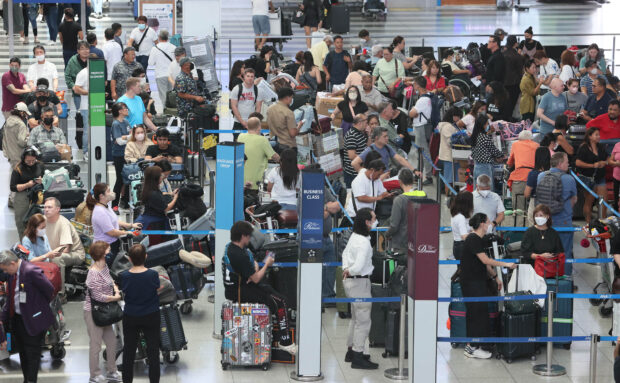
FILE PHOTO: Passengers wait in line at a check-in counter a day after the NAIA Terminal 3 experienced a power outage, causing delayed flights and cancellations on Labor Day. INQUIRER/ MARIANNE BERMUDEZ
MANILA, Philippines — Another power outage struck Ninoy Aquino International Airport (Naia) Terminal 3 just past noon on Friday, the Department of Transportation (DOTr) reported.
Transportation spokesperson Jonathan Gesmundo confirmed this to reporters in a message, stating the outage began at 12:15 at noon time.
“12:30 p.m. Gumamit (ng) generator (they used a generator), 1:29 p.m. power restored,” said Gesmundo.
Meanwhile, the Civil Aviation Authority of the Philippines said the blackout caused long lines at the immigration section of Terminal 3.
According to the Manila International Airport Authority (MIAA) in a press briefing, the outage was caused by a lapse during an electrical audit process after one of the electrical crew left a test cable intact.
This resulted in a blackout, the agency said.
“We apologize to all the passengers and stakeholders that were here at Terminal 3 today that were inconvenienced because of this brief power interruption that affected the terminal,” said MIAA officer-in-charge Bryan Co.
The outage caused a buildup of passengers, but this situation quickly subsided by 2 p.m., Co reported.
“There were less than 10 flights that were directly affected because of this brief power interruption,” he said.
“These seven to eight flights experienced some delays, but there were no cancellations of flights caused by the power interruption,” he added.
Meanwhile, the exact number of affected passengers has yet to be verified.
Friday’s power outage was fourth of this kind of incident that hit Naia since the beginning of the President Ferdinand “Bongbong” Marcos administration.
The first time was when a blackout disrupted Terminal 3 airport operations in September 2022.
It was followed by a power failure that paralyzed the country’s entire air navigation system on January 1, 2023.
On May 1, 2023, Terminal 3 experienced another blackout due to a faulty electrical current.
RELATED STORIES:
Naia may be privatized by Q1 of 2024; P141B in investment needed – DOTr
DOTr: Gov’t not to give up Naia’s assets but to allow private sector to manage airport